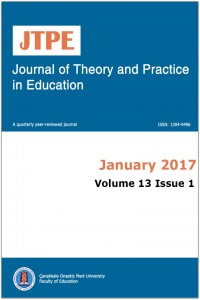STUDENTS' SATISFACTION LEVELS OF TURKISH TEACHING PROGRAM AND SERVICES PROVIDED IN THIS PROGRAM IN TURKISH TEACHING DEPARTMENT AT ÇUKUROVA UNIVERSITY
Abstract
Today, the perceptions and expectations of university
students about the programs they attend are important when the aims of the
universities are considered. In this sense, it is necessary for all the
universities in Turkey to develop some plans by determining certain priorities
which will satisfy university students and also take their expectations into
consideration. It is possible to reach a required level of education by
focusing on the subjects such as quality, satisfaction and performance. In this
study, it was aimed to determine the satisfaction level of the students
attending in Turkish Teaching Department at Çukurova University about the
services, lessons and the instructors. This study was designed using a
descriptive survey model. 106 teacher candidates in the 2nd, 3rd and 4th grades
of Turkish Teaching Department at Çukurova University participated in the
study. ‘A Satisfaction Survey for Turkish Teaching Candidates’ was administered
as data collection tool. Descriptive statistics were used in the analysis of
the data. Satisfaction levels of the participants in Turkish Teaching
program were examined in three dimensions in terms of teaching programs,
lessons, lecturers, services and facilities. It was found that
satisfaction levels of the students were, in general, low or medium.
Considering the results of the study, the realities of the country and the
students’ expectations should be taken into consideration and emphasized while
a teaching program is prepared. The results may contribute to the preparation
of new Turkish Teaching programs and to the researchers who aim to
conduct research about similar issues.
Keywords
References
- Açan, B. & Saydan, R. (2009). Öğretim Elemanlarının Akademik Kalite Özelliklerinin Değerlendirilmesi: Kafkas Üniversitesi İİBF Örneği. Atatürk Üniversitesi Sosyal Bilimler Enstitüsü Dergisi, 13 (2), 225-253.
- Ceylan, S. & Demirkaya, H. (2006). Sınıf Öğretmen Adaylarının Sınıf Öğretmenliği Programı ve Program Dâhilinde Sunulan Hizmetler Konusundaki Memnuniyet Düzeyleri. Mehmet Akif Ersoy Üniversitesi Eğitim Fakültesi Dergisi, 12, 146-160.
- Clark, R., Walker, M. & Keith, S. (2002). Experimentally Assessing the Student Impacts of Out-Of-Class Communication: Office Visits and the Student Experience. Journal of College Student Development, 43(6), 824- 837.
- Demirel, Ö. (2004). Kuramdan Uygulamaya Eğitimde Program Geliştirme. Ankara: Pegem Yayıncılık.
- Demirtaş, Z. & Kahveci G. (2010). İlköğretim İkinci Kademe Öğrencilerinin Okullarına Yönelik Beklenti ve Memnuniyet Düzeyleri. NWSA (E-journol of New World Sciences Academy), 5(4), 2150-2161.
- Denson, N., Loveday, T. & Dalton, H. (2010). Student Evaluation of Courses: What Predicts Satisfaction? Higher Education Research and Development, 29, 339-356.
- Dolmans, D., Wolfhagen, H.A.P. & Scherpbier, A. J. J. A. (2003). From Quality Assurance to Total Quality Management: How Can Quality Assurance Result in Continuous İmprovement in Health Professions Education? Education for Health, 16 (2), 210-217.
- Elliott, K. M. & Shin D. (2002). Student Satisfaction: an Alternative Approach to Assessing This Important Concept. Journal of Higher Education Policy and Management, 24(2), 197-209.
- Erdoğan, M. & Uşak, M. (2005). Fen Bilgisi Öğretmen Adayları Memnuniyet Ölçeğinin Geliştirilmesi. Gazi Eğitim Fakültesi Dergisi, 25(2), 35-54.
- Feldman, K. A. & M. Newcomb, T. (1969). The Impact of College on Students. (2 Vols.). San Francisco: Jossey-Bass.
- Haliloğlu Tatlı, Z., Kokoç, M. & Karal, H. (2011). Satisfaction State of Computer Education and Instructional Technologies Students: Karadeniz Technical University Case. İlköğretim Online, 10(3), 836-849.
- Helmich, D. I. (1999). Individual Student Characteristics and Satisfaction within the College Environment. Unpublished Doctoral Dissertation, Johnson and Wales University.
- Karasar, N. (2008). Bilimsel Araştırma Yöntemleri. Ankara: Nobel Yayınları.
- Kaya, İ. & Engin, O. (2007). Yüksek Öğretimde Kaliteyi İyileştirme Sürecinde Öğrenci Memnuniyetinin Ölçülmesine Yönelik Bir Araştırma. Millî Eğitim Dergisi,174, 106-115.
- Lamport, M. A. (1993). Student-Faculty Informal Interaction and the Effect on College Student Outcomes: A Review of the Literature. Adolescence, 28(112), 971- 991.
- Mooney, M. (2010). Religion, College Grades and Satisfaction among Students at Elite Colleges and Universities. Sociology of Religion, 71, 197-215.
- Mustafa, Z., Norbayani, B., Abidin, N. Z., Suradi, N. R. M., Ali, Z. M., Shahabudin, F. A. A. & Hamid, M. R. A. (2012). Modeling of Student Satisfaction. Journal Of Mathematics And Statistics, 8, 64-71.
- Oğuz, A. (2002). Üniversitelerdeki Öğretim Elemanlarının Yabancı Dili Geliştirme. Eğitim ve Bilim, 27(125), 17- 26.
- Okay, Ş., Özdemir, S. M. & Semiz, S. (2010). Teknik Eğitim Fakültesi Otomotiv Öğretmenliği Programı Öğrencilerinin Memnuniyet Düzeylerinin Belirlenmesi. Kastamonu Eğitim Fakültesi Otomotiv Öğretmenliği Programı Öğrencilerinin Memnuniyet Düzeylerinin Belirlenmesi. Kastamonu Eğitim Dergisi, 18(1), 209-226.
- Okumuş, A. & Duygun, A. (2008). Eğitim Hizmetlerinin Pazarlanmasında Hizmet Kalitesinin Ölçümü ve Algılanan Hizmet Kalitesi ile Öğrenci Memnuniyeti Arasındaki İlişki. Anadolu Üniversitesi Sosyal Bilimler Dergisi, 8(2), 17-38.
Details
| Subjects | Studies on Education |
|---|---|
| Journal Section | Makaleler |
| Authors | |
| Publication Date | January 31, 2017 |
| Submission Date | January 19, 2017 |
| Published in Issue | Year 2017 Volume: 13 Issue: 1 |

